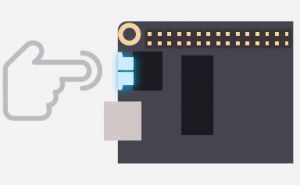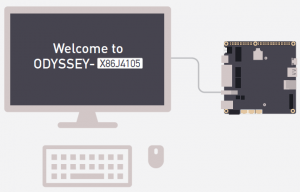Seeedstudio ODYSSEY – X86J4105 User Manual
Package Contents
- ODYSSEY – X86J4105
- User Manual
- International Power Adapter
- SATA Cable
- Antenna x2
- RTC Battery
- Heat Sink (Assembled)
- Cooling Fan (Assembled) (Included in EMMC version)
Specifications
| Processor | Intel® Celeron® J4105Frequency: 1.5 – 2.5GHz |
| Coprocessor | Microchip® ATSAMD21G1832-Bit Arm® Cortex® M0+ |
| Graphics | Intel® UHD Graphics 600Frequency: 250 – 750MHz |
| Memory | LPDDR4 8GB |
| Storage | 64GB eMMC V5.1 |
| Wireless | Wi-Fi 802.11 a/b/g/n/ac @ 2.4/5 GHz HT160Bluetooth® 5.0 |
| Networking | Intel® I211AT PCIe Gigabit LAN |
| Audio | Microphone + headphone Combo Connector |
| Headers | 28-pin header from SAMD21G1840-pin header compatible with Raspberry Pi |
| USB | USB 2.0 Type-A x2USB 3.1 Type-A x1USB 3.1 Type-C x1 |
| Video Interfaces | HDMI2.0a: Up to 4096×2160 @ 60Hz 24bppDP1.2a: Up to 4096×2160 @ 60Hz 24bpp |
| Expansion Slots | M.2(Key B, 2242/2280): SATA III, USB2.0, UIMM.2 (Key M, 2242/2280): PCIe 2.0 ×4Micro SD card SocketSIM Card SocketSATA III |
| RTC | JST 1.0 CR2032 3V |
| TPM | Built-in TPM (2.0) |
| Power | DC Jack 5.5/2.1mm or Type-C PDDC Jack input: 12-19V DCType-C input: USB PD |
| Dimensions | 110x110mm |
| Certifications | FCC, CE |
Quick Start with ODYSSEY – X86J4105
Before you StartMake sure you have the following:
- An external monitor
 Figure 1
Figure 1 - A keyboard and a mouse
 Figure 2
Figure 2 - An HDMI Cable
 Figure 3
Figure 3
Attaching External Storage
If you have bought the 64GB EMMC storage version of the ODYSSEY – X86J4105, you can skip this step. However, if you need more storage for your needs, feel free to follow this step. There are four methods of adding storage to ODYSSEY – X86J4105
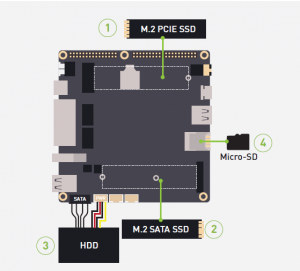
- Through M.2 PCIE Connector
- Through M.2 SATA connector
- Through SATA Connector
- Through Micro SD Card Slot
Note: Only three storage types support to install an operating system inside (M.2 SATA, M.2 PCIE and SATA), and the Micro SD Card can only be used as external storage.
Connecting Antennas
Insert the two antennas into the two sockets on the ODYSSEY – X86J4105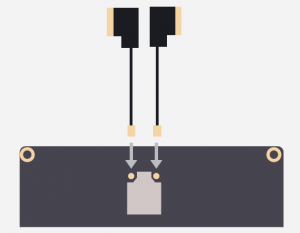
Note: One antenna is for Wi-Fi and Bluetooth whereas the second antenna is for strong 5G connectivity
Connecting to a display
Powering up
- There are two ways to power up your ODYSSEY – X86J4105
 Method 1Use the 12V/2A power adapter (provided)
Method 1Use the 12V/2A power adapter (provided) Method 2Use a USB Type-C Cable (Supports DP)
Method 2Use a USB Type-C Cable (Supports DP) - Press the power button and you will notice the blue power LED turn on

- Wait a few seconds until it boots into the operating system.

Installing an Operating System
ODYSSEY – X86J4105 supports both Windows and Linux operating systems. If you have bought the non EMMC version, you could attach an external storage by following the previous steps and install your desired operating system by creating a bootable USB drive. Also, if you have bought the EMMC version with windows pre-installed, you could additionally install Linux according to your requirements.
Step 1
Connect your bootable USB drive into one of the USB ports on the ODYSSEY – X86J4105
Step 2
Press the power button and keep pressing F7 key on the keyboard until you see the Boot Manager screen.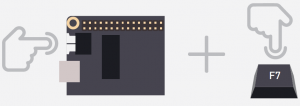
Step 3
Select the connected USB Drive as the boot drive and press enter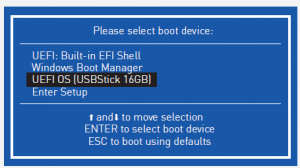
Step 4
Then follow the instructions on the installation screen to complete installing your desired operating system.
Adding 4G Cellular Connectivity
Step 1
Insert a standard SIM Card to the bottom layer of the slot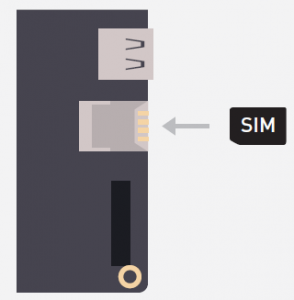
Step 2
Insert a PCIE 4G module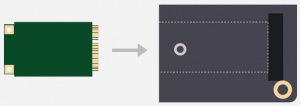
Note: This module is a must have if you want to use the connected SIM card.
Pinout diagram
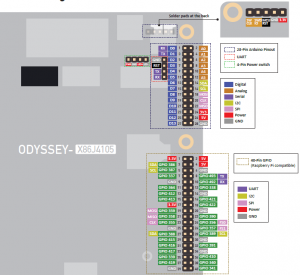
FAQ
![]() How can I access the BIOS setup?
How can I access the BIOS setup?![]() Press the Power Button and keep pressing DEL key until you see the BIOS Setup.
Press the Power Button and keep pressing DEL key until you see the BIOS Setup.
![]()
![]()
![]()
![]()
![]()
![]()
![]()
![]()
![]()
![]()
![]()
![]()
![]()
![]()
![]()
![]()
![]()
![]()
![]()
![]()
![]()
![]()
![]()
If you have any further questions, please visit forum.seeedstudio.com or send an email to
Read More About This Manual & Download PDF:
References
[xyz-ips snippet=”download-snippet”]

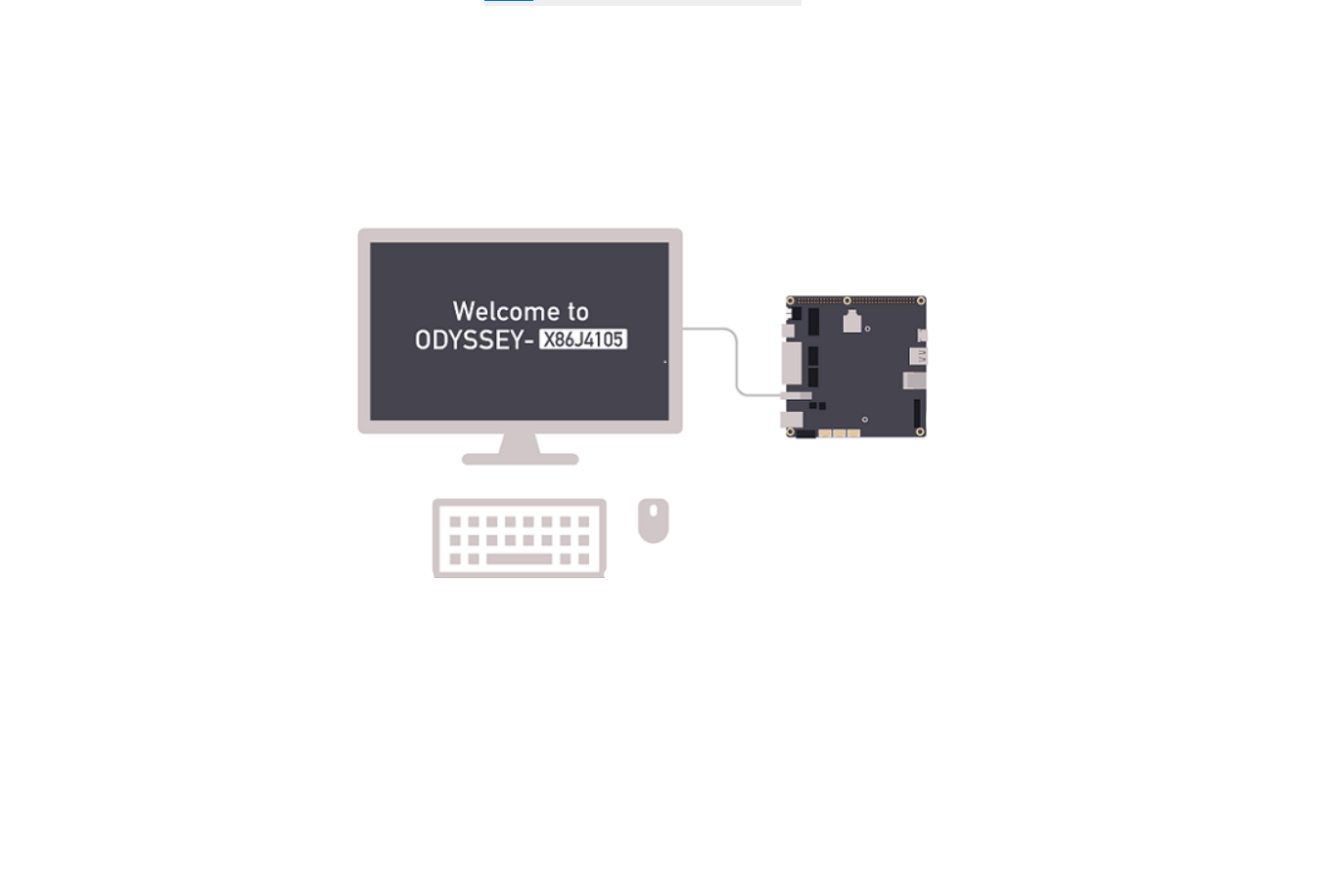
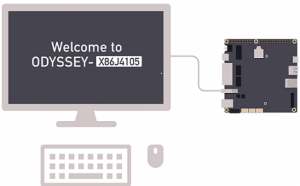
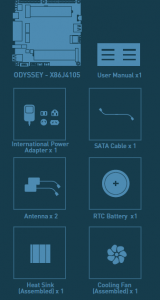
 Figure 1
Figure 1 Figure 2
Figure 2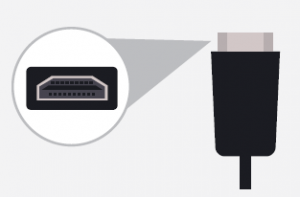 Figure 3
Figure 3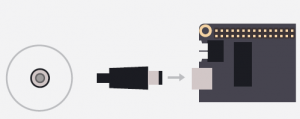 Method 1Use the 12V/2A power adapter (provided)
Method 1Use the 12V/2A power adapter (provided)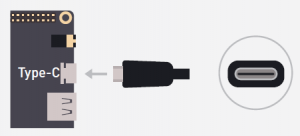 Method 2Use a USB Type-C Cable (Supports DP)
Method 2Use a USB Type-C Cable (Supports DP)